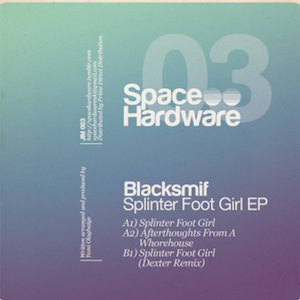Blacksmif Splinter Foot Girl EP
Making his original production debut just over one year ago, wily London artist Blacksmif (a.k.a. […]

Making his original production debut just over one year ago, wily London artist Blacksmif (a.k.a. Yemi Olagbaiye) has been quick to rack up praise. His sound, an amalgam of warped soul, UK garage, and house, also has enough polyrhythmic elements to recall the better bits of broken beat and nu-jazz, and his latest EP, this time for rookie imprint Space Hardware, only serves to expand our impression of his studio talent.
EP opener “Splinter Foot Girl” revolves around one of Olagbaiye’s doctored R&B samples. This time, the pitched-down refrain “got it bad” flirts with “but you don’t really know,” or alternately, “but you don’t wanna let it go,” the various vocal snippets maintaining a prominent presence from beginning to end. As the track proceeds, hiccuping drums, the light cascade of keys, asymmetrical bursts of bass, and a swinging ride cymbal are slowly added to the mix. A feat of meticulous programming, the harmonious clamor fades only momentarily, revealing a 4/4 beat that every previous drum hit seemed determined to avoid. This interlude is short lived though, as Blacksmif returns to gusts of rough-edged synth and a dizzying shuffle.
Kicking the production intricacy up a notch, “Afterthoughts from a Whorehouse” employs a padded skip and finely diced chipmunk vocals, living up to its giddy title and making it clear that the song’s inspiration was actually something pleasant. As jazzy rhodes and playful techno-funk bass crescendo to fill in the otherwise pockmarked rhythm with an unconventional brightness, this micro-garage meditation is a touch cheeky, but it’s also a refreshing distraction.
Though Olagbaiye seems more concerned with crafting intimately constructed compositions here, he leaves it to Klakson co-owner Dexter to create something specifically for the dancefloor. The Dutch producer imparts a subtle electro slant to “Splinter Foot Girl,” employing loose snare taps, chattering bucket toms, and thudding bass. Still, the spirit of the original is kept intact by a vocal line that’s been left untouched and the steady hum of flanged tones. It seems that Dexter knows better than to stray too far from Blacksmif’s lead; he must recognize a good thing when he hears it.

